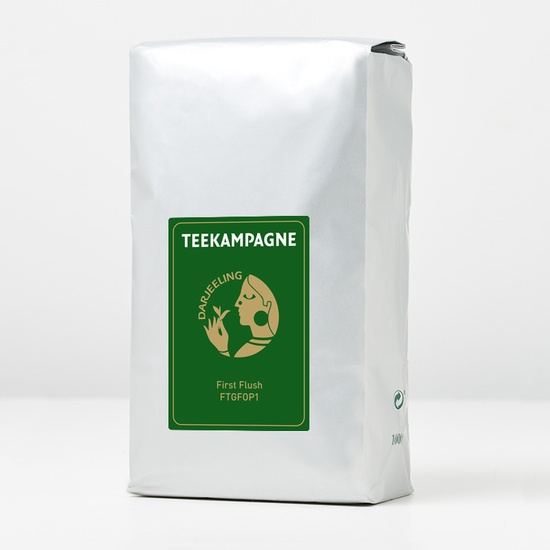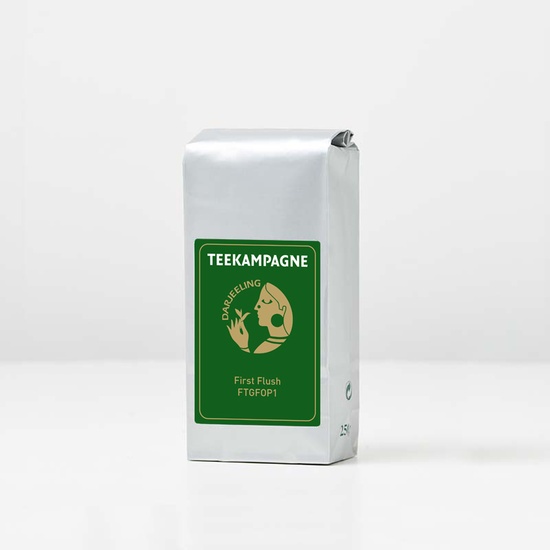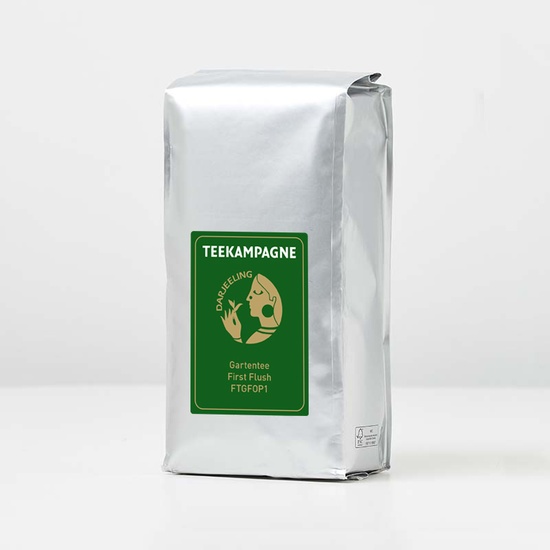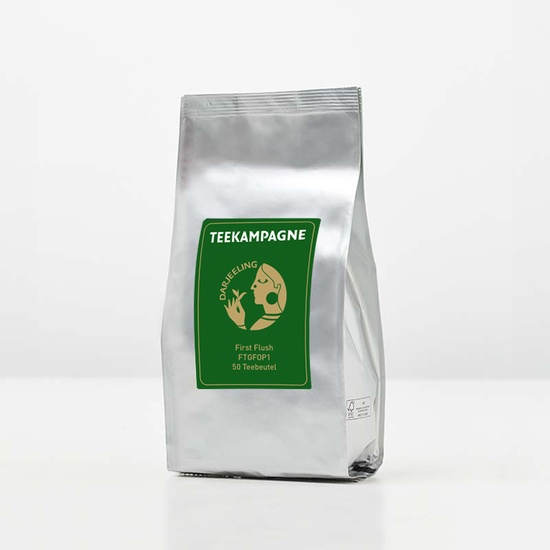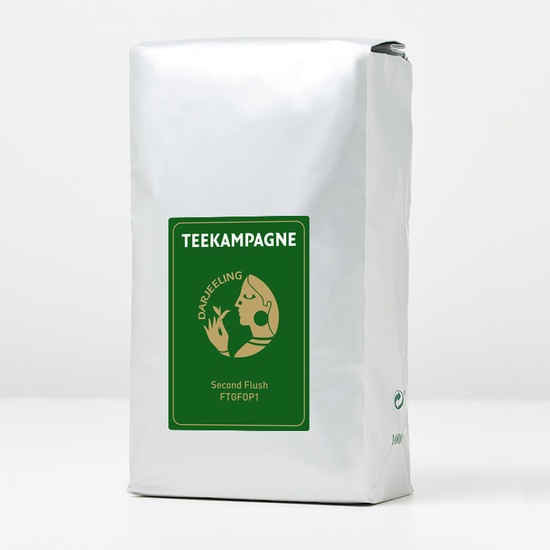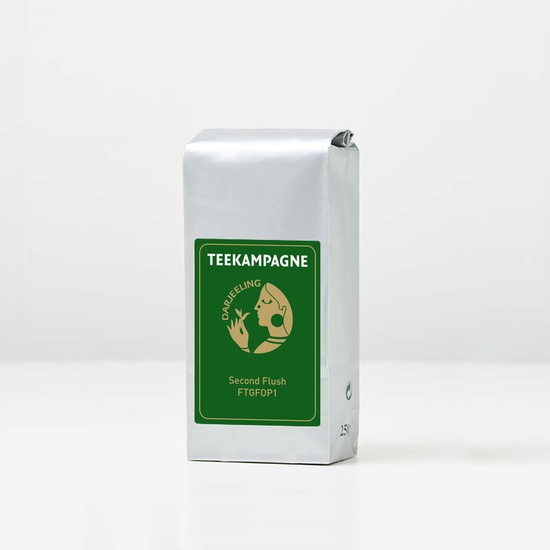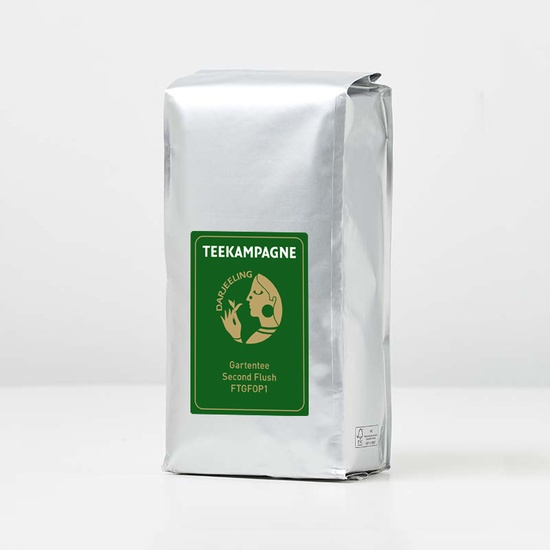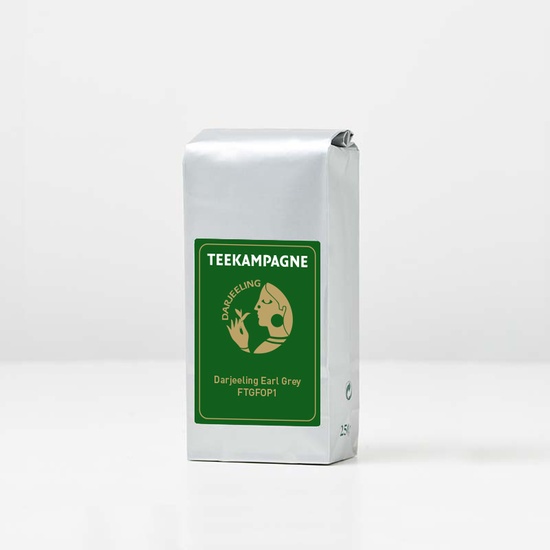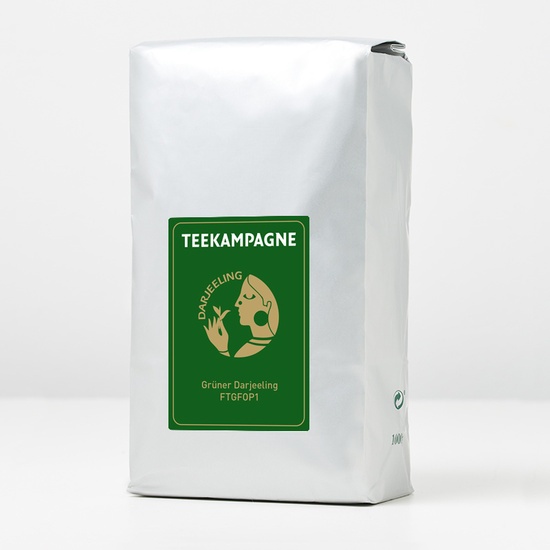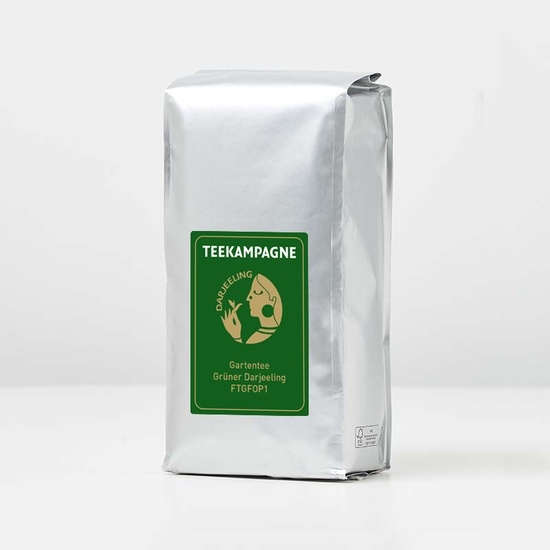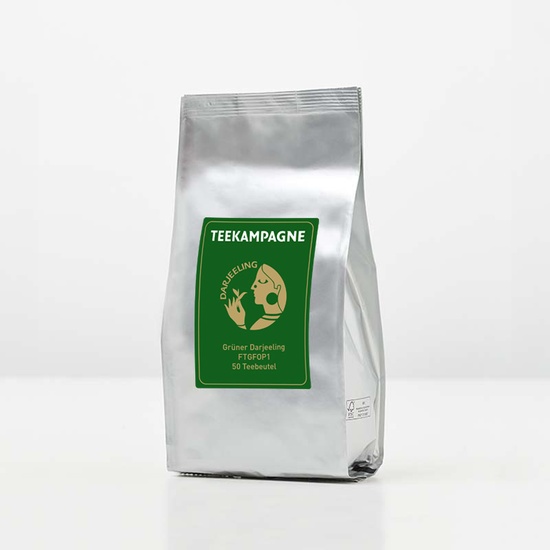© 2025 Projektwerkstatt GmbH

Darjeeling-Tee
Darjeeling First Flush & Second Flush
More InformationSchließen
Season and weather determine the harvest of First Flush and Second Flush. We guarantee that our teas have been plucked and manufactured in the indicated year.
You like to drink black tea with a lighter aroma?
Then we recommend that you try our organic First Flush. In Darjeeling tea bushes go into hibernation. When spring arrives and the tea plucking starts, the first harvest of the year is called First Flush. Plucking starts by the end of February and lasts until the end of April. Darjeeling First Flush has a fine and flowery taste and a light golden cup.
The summer harvest is called Second Flush – referring only to the time of harvest being the second in the year, starting in the end of June and lasting until the end of July. It produces a tea full-bodied tea, stronger than First Flush and with a cup that reminds of dark amber.
You like the extraordinary? Our Single Estate Teas (Garden Tea) originate from only one of the famous Darjeeling tea estates. Similar to the terroir of a vineyard you can taste the characteristics of a tea garden.
You like to drink black tea with a lighter aroma?
Then we recommend that you try our organic First Flush. In Darjeeling tea bushes go into hibernation. When spring arrives and the tea plucking starts, the first harvest of the year is called First Flush. Plucking starts by the end of February and lasts until the end of April. Darjeeling First Flush has a fine and flowery taste and a light golden cup.
The summer harvest is called Second Flush – referring only to the time of harvest being the second in the year, starting in the end of June and lasting until the end of July. It produces a tea full-bodied tea, stronger than First Flush and with a cup that reminds of dark amber.
You like the extraordinary? Our Single Estate Teas (Garden Tea) originate from only one of the famous Darjeeling tea estates. Similar to the terroir of a vineyard you can taste the characteristics of a tea garden.
Selected Darjeeling & Darjeeling Earl Grey
More InformationSchließen
Our Selected Darjeeling is an organic black tea that fits all occasions. A whole leaf tea with the grade FTGFOP1 at an unbeatable price! What more can a tea aficionado ask for? The tea is a selection of different and carefully chosen harvests. As we can purchase this tea at a lower price we can also offer it very friendly on your budget. Taste wise Selected Darjeeling ranges between a First Flush and a Second Flush – stronger than the first and lighter than the second.
Pure organic bergamot meets organic Darjeeling Tea: That’s our Darjeeling Earl Grey. Bergamot is a citrus fruit. Given that it only grows in a small coastal area of Calabria in Italy, its availability is very limited and the pure oil extracted from the peel, an incomparable natural treasure. Indulge in the combination of fine tea with notes of fresh citrus. In order to preserve the delicate aroma this tea is only available in 250g packages.
Pure organic bergamot meets organic Darjeeling Tea: That’s our Darjeeling Earl Grey. Bergamot is a citrus fruit. Given that it only grows in a small coastal area of Calabria in Italy, its availability is very limited and the pure oil extracted from the peel, an incomparable natural treasure. Indulge in the combination of fine tea with notes of fresh citrus. In order to preserve the delicate aroma this tea is only available in 250g packages.
Green Darjeeling
More InformationSchließen
If you are looking for an organic tea that hasn’t been oxidated (fermented), green tea is your tea! It is manufactured from the same tea bushes as black tea. The freshly plucked leaves are shortly exposed to heat (usually hot water steam). The heat prevents the oxidation of the leaves’ cell sap with the natural occurring oxygen in the air. The undermining of the oxidation process (sometimes also referred to as fermentation) causes the tea leaves to keep their green colour and their primary taste and properties. Green Darjeeling is mild and fresh in taste with some pleasant vegetal notes.
You like the extraordinary? Our Single Estate Teas (Garden Tea) originate from only one of the famous Darjeeling tea estates. Similar to the terroir of a vineyard you can taste the characteristics of a tea garden.
You like the extraordinary? Our Single Estate Teas (Garden Tea) originate from only one of the famous Darjeeling tea estates. Similar to the terroir of a vineyard you can taste the characteristics of a tea garden.
Teekenner sind sich einig: Die Region Darjeeling im Nordosten Indiens bringt Tee hervor, der gerne als "Champagner unter den Tees" bezeichnet wird. Ursache hierfür ist das einzigartige Höhenklima an den südlichen Ausläufern des Himalajas: Steile Hänge mit intensiver Sonneneinstrahlung, niedrigere Temperaturen und stärkere Schwankungen von Feuchtigkeit und Niederschlägen. Hier wachsen die Pflanzen langsamer und bilden kleinere Blätter aus als im Tiefland. Die aber haben es in sich: Wegen ihres unverkennbar blumigen Aromas werden Darjeeling-Tees in Indien auch als „Geschenk des Himmels“ bezeichnet.
Durch das Ursprungszertifikat des Tea Board of India können wir garantieren, dass Sie bei uns zu 100 Prozent reinen Tee aus Darjeeling erhalten.
Region Darjeeling entdecken
Durch das Ursprungszertifikat des Tea Board of India können wir garantieren, dass Sie bei uns zu 100 Prozent reinen Tee aus Darjeeling erhalten.
Ansicht:
Ansicht:
Ansicht:
Darjeeling – eine geschützte Herkunftsbezeichnung
Die geschützte geografische Herkunftsbezeichnung kennt man auch von anderen Lebensmitteln. Eines der prominentesten Beispiele dürfte der Champagner sein – nur der in Flaschen vergorene Schaumwein aus der Champagne darf sich so nennen. Seit dem 10. November 2011 ist auch Darjeeling eine geschützte Herkunftsbezeichnung in der EU. Die Vorteile des Schutzes liegen auf der Hand: Sowohl die produzierende wie die konsumierende Seite können wirksamer vor Imitationen geschützt werden. Die charakteristische Topografie von Darjeeling, die Höhenlage, die steilen Hänge und das spezielle Klima erzeugen die besondere Qualität dieses einzigartigen Tees. Wir finden, man hat ein Recht darauf, dass eine Packung Tee, deren Aufschrift Darjeeling verspricht, auch tatsächlich reinen Darjeeling-Tee enthält.
Nur Tee, der auch tatsächlich zu 100 Prozent aus der Region Darjeeling im Nordosten Indiens stammt, darf unter diesem Namen verkauft werden. Das Anbaugebiet produziert jährlich rund 9.000 Tonnen Tee und leidet massiv unter Warenfälschungen. Schätzungen zufolge werden weltweit pro Jahr bis zu 40.000 Tonnen Tee als „Darjeeling“ verkauft.
Wer bei der Teekampagne kauft, kennt das Logo für 100 Prozent reinen Darjeeling seit 1988 von unseren Teepackungen. Wir haben bewusst auf ein eigenes Logo verzichtet und stattdessen das Schutzzeichen für reinen Darjeeling-Tee gewählt. Wir führen dieses Logo, um die Menschen für das Thema Authentizität zu sensibilisieren. Konsequent unternimmt die Teekampagne alles, um dem Darjeeling-Logo weltweit rechtsverbindlich zum Durchbruch zu verhelfen. Aus diesem Grund haben wir im April 2004 als erstes deutsches Unternehmen einen Lizenzvertrag mit dem Tea Board of India geschlossen, in dem wir offenlegen, welche Mengen Darjeeling-Tee wir jährlich einkaufen und weiterverkaufen. Sie finden unsere Lizenznummer auf jeder unserer Teepackungen.
Nur Tee, der auch tatsächlich zu 100 Prozent aus der Region Darjeeling im Nordosten Indiens stammt, darf unter diesem Namen verkauft werden. Das Anbaugebiet produziert jährlich rund 9.000 Tonnen Tee und leidet massiv unter Warenfälschungen. Schätzungen zufolge werden weltweit pro Jahr bis zu 40.000 Tonnen Tee als „Darjeeling“ verkauft.
Wer bei der Teekampagne kauft, kennt das Logo für 100 Prozent reinen Darjeeling seit 1988 von unseren Teepackungen. Wir haben bewusst auf ein eigenes Logo verzichtet und stattdessen das Schutzzeichen für reinen Darjeeling-Tee gewählt. Wir führen dieses Logo, um die Menschen für das Thema Authentizität zu sensibilisieren. Konsequent unternimmt die Teekampagne alles, um dem Darjeeling-Logo weltweit rechtsverbindlich zum Durchbruch zu verhelfen. Aus diesem Grund haben wir im April 2004 als erstes deutsches Unternehmen einen Lizenzvertrag mit dem Tea Board of India geschlossen, in dem wir offenlegen, welche Mengen Darjeeling-Tee wir jährlich einkaufen und weiterverkaufen. Sie finden unsere Lizenznummer auf jeder unserer Teepackungen.

